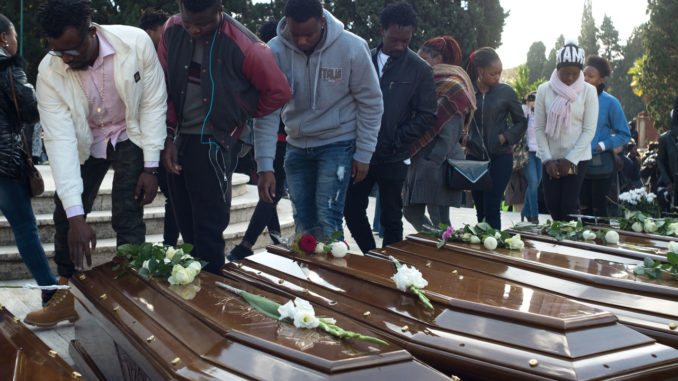
The death of 26 migrant Nigerians, all female, between the ages of 14 and 18, whose bodies were recovered from the Mediterranean by a Spanish Warship, Cantabria, the other day is the latest poignant illustration of how deeply Nigerians are involved either as traders or victims in the international web of human trafficking.
By all accounts, human trafficking is the third biggest criminal enterprise in the world. While illegal arms trade ranks second, drug trafficking comes first. Essentially, human trafficking has become a big international business with no regard for the sanctity of human life. The case of those 26 girls whose remains were eventually taken to the Southern Italian Port of Salerno is certainly one too many and Nigerians are not only saddened by this monumental loss, the country is shamed by it.
What is responsible for the increasing rate of human trafficking from Nigeria?
This is certainly an unhappy land, a land where the lowly placed majority can hardly live, let alone thrive. Therefore, one cause of human trafficking is widespread poverty. The phenomenon is further aided by ignorance, peer pressure and a false hope of life abundant abroad. This is compounded by insecurity of lives, a weak legal system, porous borders, corrupt government officials and the involvement of international organised criminal groups or networks. There are also cases of false marriage proposals from men to women who plan to sell trafficked victims into bondage as well as the practice of entrusting poor children to more affluent friends or relatives, which creates vulnerability. Disturbingly, some parents also commoditise and sell their children, not just for the money, but also in the hope that those children would escape chronic poverty.
This, of course, is a sign of the breakdown of cherished family values, of greed nurtured by poverty and an untold moral decadence that has afflicted Nigeria.
Nigeria certainly has not done right by her productive population. No infrastructure for self-actualisation and no succour from the state by way of institutionalised mechanisms for hope. This failure is therefore propelling people to embark on suicide missions. So, the pervasive wave of illegal migration could be blamed on the unacceptable rate of unemployment in the country, an inefficient and corrupt law enforcement system that is ill-equipped to fight crime, one that is often in collusion with traffickers.
Obviously, this land is pushing the people to embark on suicide missions in the name looking for the ever-elusive greener pastures. Unfortunately, trafficked victims are mainly subjected to forced labour and forced prostitution in the places they thought would give them hope. Many die in transit as in the case of the 26 girls.
Against this background, the efforts of many people and organisations to eradicate human trafficking must be commended and even intensified. Edo State’s former governor’s wife, Eki Igbinedion, through Idia Renaissance, a non-governmental organisation (NGO) fought human trafficking and prostitution, a prevailing trade among girls from Edo State vigorously. Another notable organisation, Women Trafficking and Child Labour Eradication Foundation (WOTCLEF), took a strong stand against women trafficking and child labour and advocated for the establishment of the National Agency for the Prohibition of Trafficking in Persons and other related matters (NAPTIP) in 2003 by an Act, amended in 2005 to increase the penalties for trafficking offenders and prohibits all forms of human trafficking.
Therefore, NAPTIP should come up with a National Plan of Action to ensure that victims stranded in transit are rescued and brought back to Nigeria. Specifically, NAPTIP should reinforce measures in international treaties and conventions on trafficked victim, work in collaboration with other agencies or bodies such as Police, Customs, Immigration, non-profit organisations to ensure safe return of the victims. Returnee trafficked victims should be kept in shelters counselled, rehabilitated and reintegrated into the society.
NAPTIP should initiate investigations into the case of the 26 dead girls and provide assistance and information that can facilitate the arrest and prosecution of offenders. The National Orientation Agency (NOA) and the media should raise awareness and educate women and men on the dangers of illegal migration.
To ensure the elimination and prevention of the causes of trafficking of women for commercial sex purposes, government and other stakeholders should create economic programmes for girls at the risk of being trafficked. NAPTIP and NOA should embark on social engineering campaigns to sensitise the citizenry on a continuous basis. To young Nigerians, especially girls, desperate to go abroad, it is now obvious that there is no place like home. The countries in which many Nigerians are seeking refuge were built by people. So, while the governments at all levels in Nigeria may be challenged to create an environment for people to thrive, it is important to ask citizens too to stay and help build Nigeria. Parents need to train their children on the path of honour as poverty is not an excuse for lack of character. Parents should motivate their children to aspire and work hard to reach a better tomorrow.
END

Be the first to comment